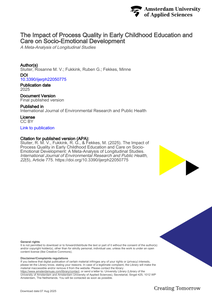We investigated the relationship between process quality in early childhood education and care (ECEC) and children’s socio-emotional development in a meta-analysis of longitudinal studies. Our multi-level meta-analysis of 31 publications reporting on 16 longitudinal studies (N = 17,913 children, age: 2.5–18 yrs) demonstrates that the process quality of ECEC is a small but significant predictor of children’s socio-emotional development over time (ES = 0.103, SE = 0.026, p < 0.001, 95% CI: 0.052–0.155). This longitudinal association extends to the age of 18 years in our sample. Process quality of ECEC is, thus, a significant and stable predictor of children’s socio-emotional development and well-being from toddlerhood to adolescence. The longitudinal relationship was moderated by the type of care (center-based vs. home-based) and the informant (parent, professional caregiver, external assessor, or self-report of the child). Implications for future ECEC research are discussed.
MULTIFILE

We used a validated agent-based model—Socio-Emotional CONcern DynamicS (SECONDS)—to model real-time playful interaction between a child diagnosed with Autism Spectrum Disorders (ASD) and its parent. SECONDS provides a real-time (second-by-second) virtual environment that could be used for clinical trials and testingprocess-orientedexplanationsofASDsymptomatology.Weconductednumerical experiments with SECONDS (1) for internal model validation comparing two parental behavioral strategies for stimulating social development in ASD (play-centered vs. initiative-centered) and (2) for empirical case-based model validation. We compared 2,000 simulated play sessions of two particular dyads with (second-by-second) time-series observations within 29 play sessions of a real parent-child dyad with ASD on six variables related to maintaining and initiating play. Overall, both simuladistributions. Given the idiosyncratic behaviors expected in ASD, the observed correspondence is non-trivial. Our results demonstrate the applicability of SECONDS to parent-child dyads in ASD. In the future, SECONDS could help design interventions for parental care in ASDted dyads provided a better fit to the observed dyad than reference null
DOCUMENT

Education for sustainable development (ESD) presents challenges to secondary science teachers. Characteristic aspects such as action-oriented teaching, stance-taking, interdisciplinary problem solving, and emotional and value-oriented teaching cause tensions for teachers accustomed to traditional science teaching. To help future science teachers face these challenges, understanding how these tensions are rooted in teaching visions is crucial. In the context of teacher education, this study aims to explain pre-service science teachers’ visions on these tension inducing aspects of ESD. Through a qualitative analysis of interviews and written reflections of ten participants in a course on ESD, we document beliefs and experiences that underlie their visions. A belief that supports teaching ESD is that education should contribute to a sustainable future. Prevalent beliefs that cause tensions with ESD are that education should not impose values; that one’s subject matter knowledge is insufficient; and that the scientific knowledge is unreliable. Experiences from the course that influence these beliefs, are confrontations with visions of peers, pupils, and professionals; exposure to ESD teaching practices; and inquiry into a socio-scientific issue, all of which alleviated tensions. Findings help teacher educators understand pre-service science teachers’ visions and provide suggestions for activities that foster vision development.
MULTIFILE